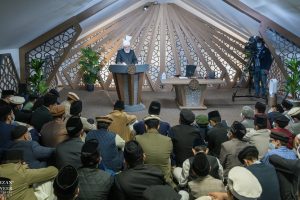
Professor Amtul Razzaq Carmichael, UK
Anthropological research demonstrates that sacrifice has been the very heart of the history of human progress. [1] Sacrifice has been offered as a magical or ritualistic practice to attain power, children, or authority. Amongst ancient communities, sacrifice was offered as a gift to gods to secure their favour or minimise their hostility, and as a gesture of sacramental communion. Amongst Abrahamic faiths, sacrifice is not a regular part of modern Jewish worship. Christianity believes in the sacrifice of the son of God for the atonement of sins of humanity. [2] The Islamic concept of sacrifice has got a profound philosophy.
The word sacrifice ‘Qurbanun’ in Arabic is derived from the term ‘Qaraba’, which means ‘he came near’. The Islamic concept of sacrifice is based on the philosophy of the ‘surrender’ of the self, in pursuit of a higher goal. The ultimate objective of man’s life is to reflect the attribute and qualities of God in his being and character. This is a sublime and glorious goal. This means to be ready to submit oneself entirely to Allah the Exalted, in recognition of the fact that Allah the Exalted is the only Being Who deserves to be made the true object of one’s love and the true goal of one’s life. The love of wealth, power, position, family, or even one’s love for oneself should not be allowed to hinder one from attaining this superb goal.
Attaining nearness to God is a magnificent achievement. This provides a bond of friendship with the Ultimate Power and Authority. This is the key to success in this world and a triumph in the Hereafter. In practical terms, the concept of the nearness of God can be understood by following this Hadith. God Almighty says about an individual who has gained his nearness, ‘…when I love him, I become his eyes with which he sees, his hands with which he holds, and his legs with which he walks. If he asks Me for something, I will certainly grant it to him and if he wants My refuge I shall certainly grant him My refuge…’ [3] This is the ultimate charter of success. Not just that, God Almighty also asserts that He would declare war against anyone who shows enmity against His friend. This is the ultimate protection.
The fundamental philosophy of Islamic sacrifice is to relinquish the lower form of gains for a higher form of success. The worldly successes and achievements are temporary and minuscule when compared to the true success of finding God. Therefore, Islam enjoins its followers to forsake the fleeting accomplishments of this material world if they get in the way of the ultimate victory of the Divine nearness.
A great thinker, very wisely said, ‘what gravitation is to the physical world, love is to the spiritual world’. [4] The human soul always is attracted to the divine, but the love of other things holds humans back from progressing on the path of nearness to God. The love of material things acts as a barrier to spiritual progress. Therefore, a believer is enjoined to always be ready to part with the baggage that weighs him down and slows his spiritual growth. To facilitate the true practice of sacrifice, every act of Islamic worship is based on the principle of sacrifice. Salat, the formal prayer requires one to sacrifice time, focus, and energy to gain spiritual enlightenment. The Islamic worship of fasting is an expression of readiness to sacrifice, even what is lawful, in obeyance to the commandment of God. Giving one’s hard-earned money to charity is an evident act of self-sacrifice. All these forms of worship are a practical way to reinforce the vital concept that self-realisation requires self-sacrifice. The Holy Qur’an says, ‘Never shall you attain to righteousness unless you spend out of that which you love…’. [5] This signifies that a Muslim would be prepared to let forego anything, no matter how dear to him, if it hinders him from attaining his sublime goal of attaining nearness to God.
It is not just the outwardly practice of sacrifice that is accepted by God, but God seeks and rewards the deep fortitude and determination that underpins the act of sacrifice. The outwardly practice of sacrifice serves as a conduit for the spirit of devotion that draws divine nearness. One needs to be disciplined and lead one’s life abiding by the fundamental principle of giving religion preference over all worldly pursuits and interests. A practical application of this principle is that whenever one finds oneself in a position where the demands of religion are conflicted with the demands of the material world, then one must always choose the path of religion. This is not easy and requires great patience and endurance. In return, this effort is rewarded by an even greater recompense by God. May we be empowered to pursue this path by remaining focussed on the ultimate reward, nearness to God. Ameen.
About the Author: Professor Amtul Razzaq Carmichael MD, MEd, FRCS (Gen Surg.), MBBS, is a consultant. She qualified in 1987 with gold medals for academic excellence and undertook her surgical training at major teaching hospitals in London, Edinburgh, and Philadelphia. She has authored many articles for major peer-reviewed scientific journals. She is a senior member of The Review of Religions Editorial Board as well as Assistant Manager.
ENDNOTES
[1] https://www.britannica.com/topic/sacrifice-religion/Theories-of-the-origin-of-sacrifice
[2] https://www.britannica.com/topic/sacrifice-religion/Theories-of-the-origin-of-sacrifice
[3] https://www.alislam.org/friday-sermon/2009-10-30.html
[4] https://rorenglish.wpengine.com/21830/review-of-religions-october-1921-edition Page 405




Add Comment